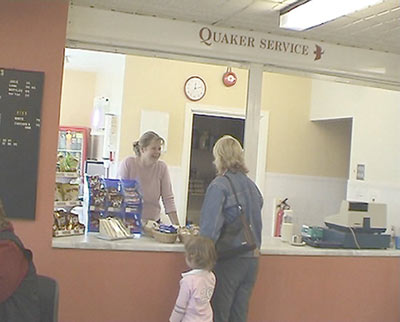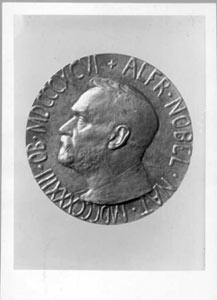
The Religious Society of Friends (Quakers) in Ireland
Friends' Testimonies
Our peace testimony is the best known. In 1651 George Fox explained why he would not accept the offer of a captaincy in the army "I live in the virtue of that life and power that takes away the occasion of all wars". In 1661 in a declaration to Charles II, Friends said "We utterly deny all outward wars and strife and fightings with outward weapons, for any end or any pretence whatsoever". We still try to find peaceful solutions wherever conflict arises, whether in everyday life or in wars between peoples. We are small in numbers, but hope that our efforts will encourage others to do likewise. In 1947 the Nobel Peace Prize was awarded to the Friends Service Council (of the UK and Ireland) and the American Friends Service Committee to recognise their relief work with refugees after World War II.

Visitor's Centre at Maghaberry prison, Co. Antrim
Our testimonies regarding integrity, simplicity, the sacraments, baptism, the creed and the equality of men and women are referred to in the panel "What Friends Believe".
We have always refused to swear oaths. Firstly, one should tell the truth whether or not one has sworn on the Bible, there should be no double standards. Secondly, the Biblical admonition "Swear not at all". Early Friends suffered greatly because of this – refusal to swear allegiance led to thousands being sent to gaol, where some died. For two centuries this testimony was one of the reasons that Friends could not enter universities. On principle we still insist in "affirming" rather than "swearing" in a court of law.
In early days our testimony against paying tithes, often 10% of one's income, to the established church (to which of course Friends did not belong) led to seizure of goods from Friends worth millions of pounds over a period of years – the equivalent of an enormous sum nowadays.
We have testimonies against betting, gambling and capital punishment, and in support of temperance, conflict resolution and prison reform.
With the intention of showing that all are equal many Friends address people simply using first and last names, omitting Mr, Mrs, Miss, The Hon, Sir, etc. Similarly Quaker men used to refuse to take off their hats in front of anyone except God. (This made judges, priests and the like furious!).

Nobel Prize: awarded to Friends for work with Refugees after the 2nd World War
Simplicity in dress was a testimony against extravagance and the love of self-indulgence, but became an end in itself and was dropped. In society "you" was used to address upper class people and "thee" to the lower classes, so Friends used "thee" and "thou" to everyone to show equal respect to all. This died out last century.
Friends were in the forefront of the anti-slavery movement with an American Friend, John Woolman, being particularly persuasive.